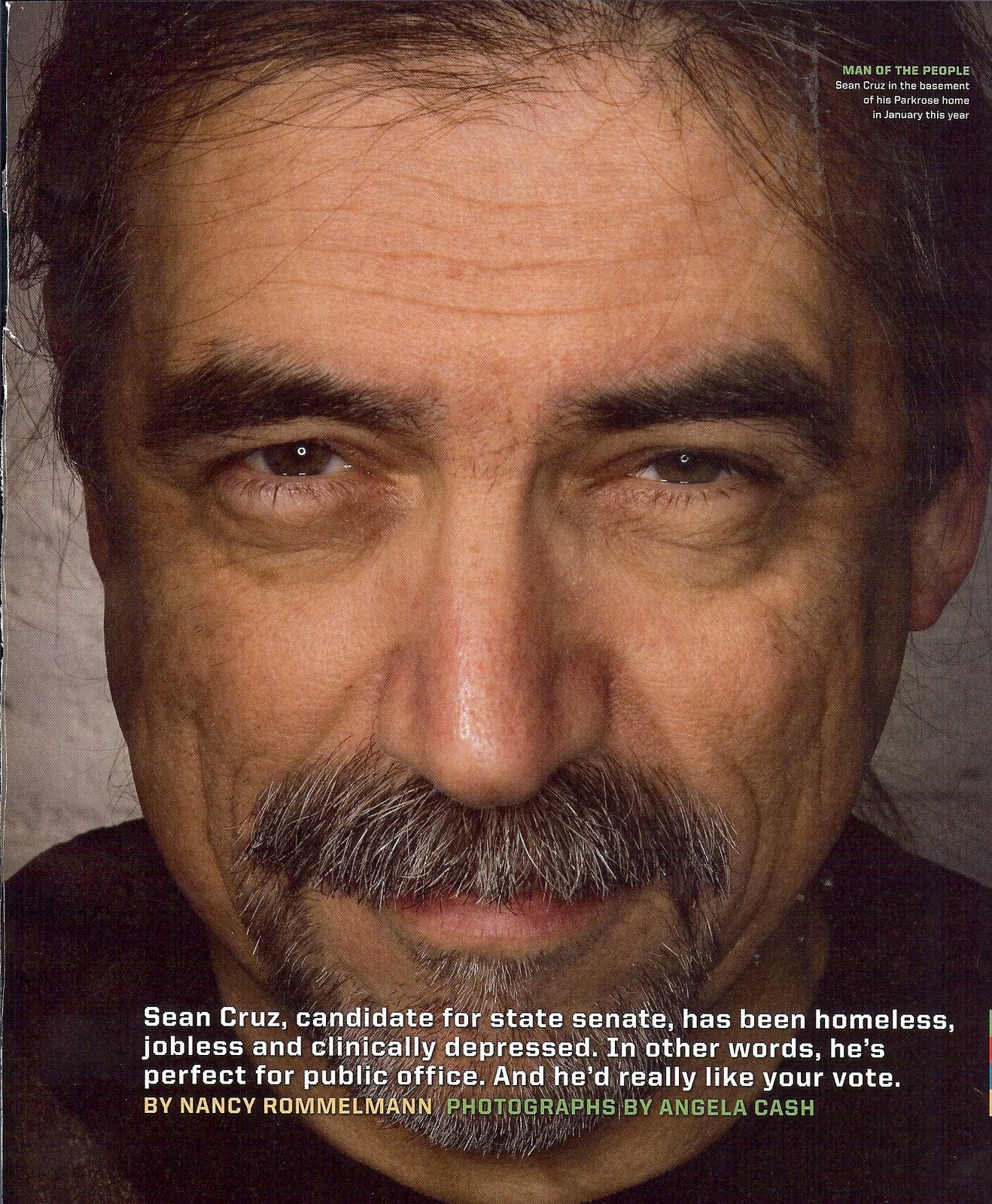Portland, Oregon-- As attention turned for some to the symbolic fifth anniversary of the start of the Iraq invasion in mid-March, and the benchmark of 4,000 combat deaths, the stress of the past six years caught up with me….
My dread and horror of the consequences of invading Iraq were formed long before the invasion took place in 2003….
When the September 11 attacks occurred, both of my sons were already members of the Utah Army National Guard. Aaron was 19 years old, Tyler 18.
As the Bush Administration dragged the nation down into the quagmire of Iraq, I saw my hopes and dreams for my sons destroyed as more than a thousand endless days and nights passed by, nearly twice that now, unceasing agonizing worry.
I saw Aaron leave our home in Portland in November 2003, clad in his full dress army uniform, ready to report for duty despite his illnesses, serious enough to qualify him for the Oregon Health Plan, and I saw Tyler off to Ramadi in the summer of 2005.
Neither has come home from the war.
Aaron died in Utah on his way to Iraq, a preventable death, a death that could have been prevented by providing him in Utah the medical treatment he was receiving here in our home under the Oregon Health Plan (he was covered, but I was uninsured).
In May 2005, I saw Aaron’s flag-draped coffin, heard his former commanding officer and other members of his unit, clad in full dress uniforms, speak of his courage and devotion and of how they loved him.
Aaron was a victim of medical neglect while under Army orders. Without his meds, without medical care, alone and homeless in Utah, he suffered a seizure, lapsed into a coma and died.
His Portland doctor had predicted this outcome when Aaron left our home to report for duty in 2003.
Eight hours after we buried his brother, Tyler was on his way back for his second deployment as a .50 caliber machine gunner on a humvee, this time to Ramadi, where 75 of his comrades would die and more than a thousand soldiers and marines suffered serious injuries, a quarter of the entire force, living in squalor.
My dream for Tyler had been Stanford or Arizona State, a baseball scholarship and the US Olympic team. I often envisioned the years I would spend, following him from place to place to watch him work his magic on the field, building my calendar around his game and practice schedule the best I could.
But today I do not know where he is. Or how he is. Or what will happen next.
I wait for him to come home at all times. And for my two beautiful, long-lost daughters.
All of these thoughts, the long six years, the loss of Aaron, his needless suffering, what would have been his March birthday, all of these things and more combined to form such overwhelming grief that I missed the filing deadline for the voter’s pamphlet by four days.
March 21 would have been Aaron’s birthday.
I walked my dog five times a day in my Parkrose neighborhood all through mid-March.
After Aaron and my three other children disappeared on February 12, 1996, I fought for seven years through four jurisdictions in three states to locate and recover them, all in vain despite a lawful joint custody order.
In 2003, Aaron contacted me, told me he was ready to come home, asked me to come and get him. I was on my way to Utah the next day, the seats to my van left behind to make room for whatever belongings he had.
The mental and physical condition he was in was shocking, the suffering he had endured during those seven horrific years, isolated in theocratic Utah with an abusive stepdad and a disinterested mother, was written all over him.
For the next three months, my total, full-time focus was on getting Aaron medical attention, while absorbing how his kidnappers had crushed the joy and hope out of his life. I could only guess at how my other three children had fared, at how long the road to recovery would be.
Aaron was ill enough to qualify for the Oregon Health Plan in September 2003.
He did not get that way overnight. He was visibly ill for years, and no one helped him.
The Army pronounced him fit for duty in Iraq, some few days after the letter arrived from his doctor, a warning about the seizure disorder that would take his life.
Here in Portland, he was too ill to sit upright in my van, and he would lie on the floor as I drove him to his medical appointments, both ways, through September, October and November. I never did put the seats back in my van.
When his orders arrived for deployment to Iraq in November 2003, he let me know that nothing would stop him from joining his brother and his unit.
He left the day after Thanksgiving, 2003, racking up more than $ 300 in traffic fines on his way to Utah, which I paid for, along with all of his other expenses.
I went broke keeping Aaron alive while the Army held him in Utah.
I fought for seven years to find him and bring him home, and three months later the Army took him back to Utah.
When people pick arbitrary numbers and dates, most recently 4,000 combat deaths and five years since the occupation of Iraq began, to make a symbolic gesture or expression regarding these life and death issues, the public and the media focus for a minute and move on.
But these numbers and dates do not remotely capture what is really happening among the small fraction of Americans who are paying the price for the American catastrophe in Iraq, making the blood sacrifices, foregoing dreams, family, future.
Oregon military families suffer in isolation. Look around you and ask yourself:
Who do you know, five years into the war, that has served or will serve? Has the war reached your neighborhood at all?
The lives of most Americans are untouched, even by inconvenience, with the lone exception of rising fuel prices.
Local television news programs broadcast the locations of gas stations offering the lowest prices; drive over there and save yourself two cents a gallon.
The nation’s college campuses are hotbeds of rest and inaction, if not actual privilege.
Oregon’s legislative candidates seem to be taking the position that the war is a federal issue, no room on the campaign literature for a single four-letter word: Iraq.
That is not my position. The direct costs of the war and its indirect costs bleed the nation of the resources we need to solve our many problems here, and that is no secret to anyone.
This must be part of the discussion in every political race at all levels. We must puncture the bubble.
I am not in the voter’s pamphlet for the May 20 primary.
What this means for my campaign to succeed Avel Gordly in the Oregon Senate will be the subject of several future postings.
It is not in itself a fatal complication, but it certainly gives my advantage-rich opponent yet another advantage.
Success in this race will double-underscore the fact that this campaign is driven by ordinary citizens, and not by special interests.
Success in this race will depend on being right on the right issues, and being the right person to deal with them.
It is April now. The hell of March is past. I have regained my focus. It is all too clear how important this race is.
600,000 Oregonians lack affordable health care, suffer prescription anxiety, worry about what will happen to them as they age.
They need an Oregon Senator in Senate District 23 who will work hands-on on these issues.
Oregon’s population of 300,000 veterans and their families is grossly underserved and under-represented in the state legislature, where there is no Senate Veterans Affairs Committee.
They need a passionate advocate who will bring great focus to their issues, working jointly with the House on a new Senate Veterans Affairs Committee.
I will give you four years of my life, devoted to this work.
If you have strong feelings about the occupation of Iraq and the war in Afghanistan, feelings strong enough that you want to be heard in the Oregon Senate, then take this action, do this one thing: Send me there!!
Send me to the Oregon Senate, representing the constituents of Senate District 23.
Posting these comments is a way of putting some closure on a very difficult month of March…
For those I may have angered or disappointed during the month, lo siento mucho….
Okay, I’m not in the May 20 voter’s pamphlet….
Time to take the lemon….
Depression is a disability that kills 20,000 Americans a year, mostly silently.
Make some lemonade…
…to be continued….
==============================
More than ever, I need your help to make a difference for Oregon and Oregonians:
Campaign: www.seancruz.com
Contribute online: www.actblue.com
Mail contributions to: Friends of Sean Cruz
POB 30093
Portland, Oregon 97230
Volunteers, contact me at: info@seancruz.com
Blog: www.blogoliticalsean.blogspot.com
Portland Monthly Magazine: www.portlandmonthlymag.com
March feature “The Underdog” is still available through the magazine.
Subscribe to:
Post Comments (Atom)






No comments:
Post a Comment